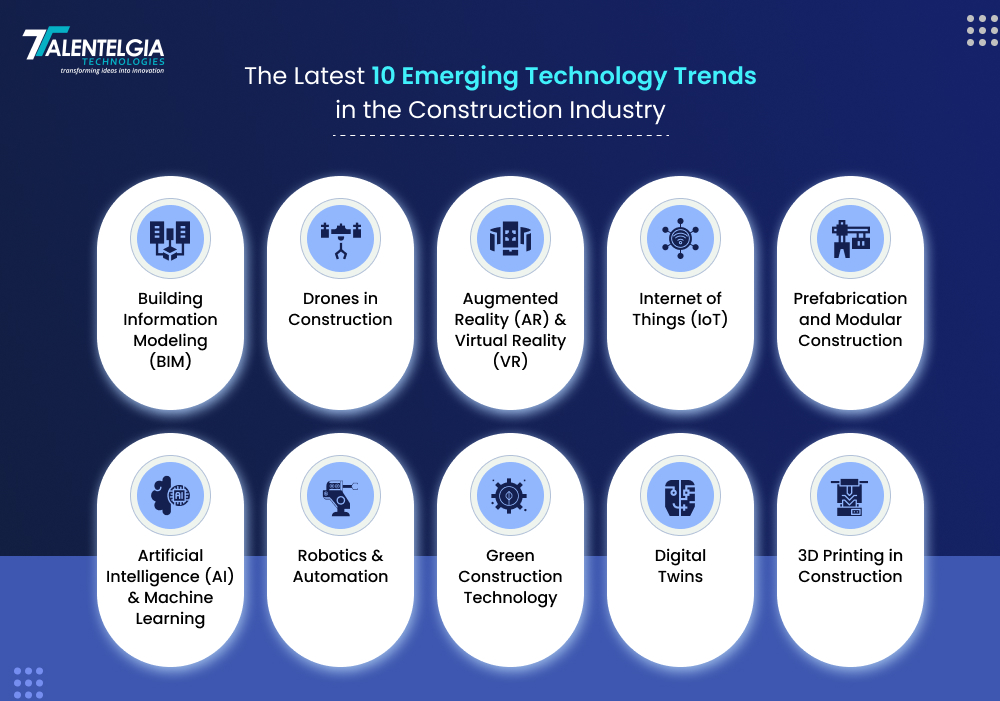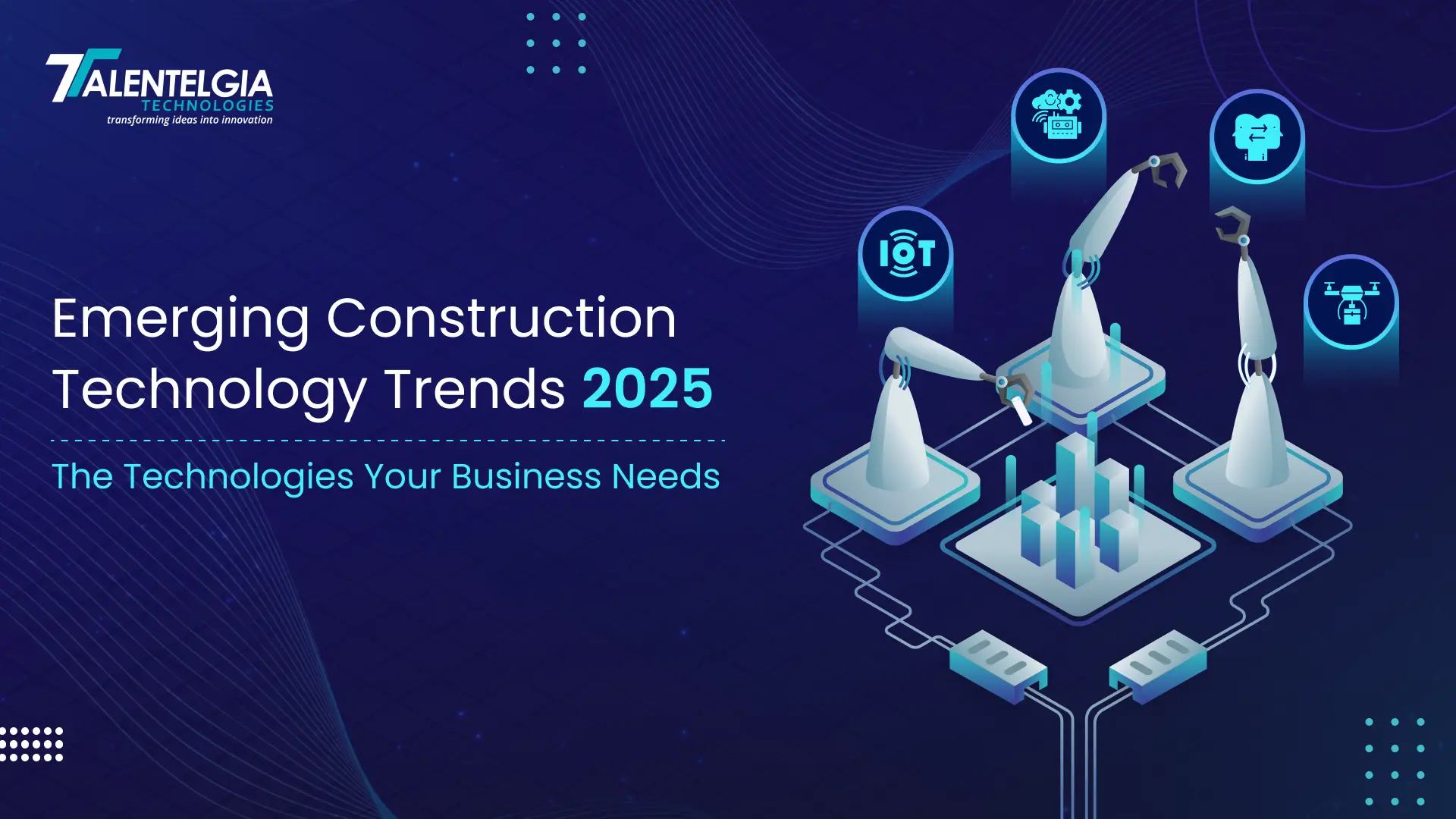The Global Construction & Building Materials Market size was estimated at USD 916.31 billion in 2019. It is expected to reach USD 1,282.56 billion by 2025, at a CAGR of 5.76%.
This shows the promising scope this industry offers for established businesses and startups. Just like every business is transforming; the construction technology trends are also changing the face of this industry.
The construction industry no longer follows the old-fashioned traditional practices. Real estate app development and construction technology trends are now transforming this industry.
The use of the latest technologies by businesses is changing the way infrastructure is built and maintained. So, read below to explore the construction technology trends in the Architecture, Engineering & Construction (AEC) industry.
Top 10 Emerging Technology Trends in the Construction Industry
Construction-related spending accounts for 13 percent of global GDP. The construction industry is witnessing an innovation wave, driven by advanced technologies. It is expected to grow $8 trillion by 2030.
This use of the latest technology in AEC is redefining traditional processes. It is also enhancing efficiency, and creating opportunities for sustainable growth with the latest construction technology trends. From digital modeling to smart machinery, the on-rising technologies are resolving long-standing issues and opening new possibilities, let’s discuss some of these:

1. Building Information Modeling (BIM)
Building Information Modeling (BIM) has changed the construction industry. It enables digital representations of the physical and functional characteristics of structures. This BIM also gives architects, engineers, and contractors a real-time opportunity to collaborate accurately, reducing error possibilities. Therefore, it can help teams visualize the lifecycle of a project before actually breaking ground, thus bettering resource management and cost control.
The energy-efficient designs and simulations in BIM technology also support sustainable construction. Along with 3D modeling, BIM has evolved into 4D and 5D models. This also includes the time and cost dimensions in planning. Moreover, companies that use BIM experience fewer project delays and higher client satisfaction.
Future developments: Wider application and integration with other technologies, such as AR and IoT, to make it even more efficient.
2. Drones in Construction
This construction technology trend has become crucial in construction projects. Drones have high-resolution cameras and sensors. These carry out real-time site surveys, progress tracking, and safety inspections. Moreover, they can go into areas that humans can’t reach, making them gather data from hard-to-reach places with minimum risk to human labor.
Drones also enhance project management by producing accurate topographical maps and 3D models. With faster and more detailed site analysis, the decision-making process becomes more accurate, saving time and money.
Future developments: Improved drone applications with AI-powered analytics. This will enhance site monitoring and predictive maintenance.
3. Augmented Reality (AR) and Virtual Reality (VR)
Experts predict that the will likely grow to $150 billion by 2030. By the end of the decade, enterprise AR will account for 65% of global AR revenue, as enterprise AR headsets dominate the market.
AR and VR app development are changing how construction projects are visualized and executed. AR overlays digital information onto the physical world and allows workers to view design blueprints and instructions in real time. VR immerses stakeholders in a virtual environment and allows them to experience and review designs before beginning construction.
These technologies enhance internal team and client communication. It reduces errors and hastens the training process. Due to its interactive nature, this construction technology trend helps to minimize miscommunication, which then makes sure that projects actually fit the client’s brief.
Future developments: Higher integration with BIM and wearable technology for even better collaboration and on-site efficiency.
4. Internet of Things (IoT)
“Majority of construction businesses are adopting IoT for visible results.” – a PwC survey.
IoT connects machines, equipment, and workers through smart devices, making a more interconnected construction ecosystem. The sensors of IoT monitor the usage of equipment, track materials, and enhance safety by detecting hazards in real time.
For instance, wearable devices can monitor worker health and alert supervisors in case of emergencies.
This construction technology trend also helps predictive maintenance, which in turn provides data-driven insight into equipment performance. It also ensures less downtime and lower costs related to repair. The aspect of streamlining operations for resource optimization makes this technology a must-have for every modern construction project.
Future developments: Increase in application of IoT in enhancing analytical capabilities of the project with completely automated construction sites
5. Artificial Intelligence (AI) and Machine Learning Technologies
AI and machine learning development are transforming the construction industry. From project planning and scheduling to risk management, AI analyzes vast amounts of data to optimize workflows and predict potential issues. Machine learning algorithms can forecast project outcomes, helping teams adjust plans proactively.
AI-based chatbots and virtual assistants also ensure quicker communication with faster answers to questions. Additionally, this technology trend increases safety by looking into accident patterns and providing a precautionary approach.
Future developments: Autonomous machinery and software based on AI and more comprehensive project automation.
Also Read: Construction ERP Software Development
6. Robotics and Automation
Robotics is transforming labor-intensive activities in construction towards productivity improvement and reduced risk factors. The tasks, such as bricklaying, welding, and concrete pouring, are dealt with through precision by robot arms and other machines working around the clock. Hence, these business automation services reduce project durations.
This technology trend ensures that the automation of site inspection and quality control occurs. This ensures that the flaws can be sensed through the use of robotic systems, ensuring proper alignment as per design. It would also mitigate the shortage of manpower at a given instance.
Future developments: Further development of autonomous vehicles and robots for end-to-end project execution.
7. Green Construction Technology
The construction industry is making sustainability a priority and green technology is the driving force. Energy-efficient building materials use renewable energy systems to minimize the environmental effects. Further, solar panels, green roofs, and energy-efficient HVAC systems have become the norm.
Other applications of this technology trend involve smart building systems that will optimize energy consumption and waste reduction. The inventions follow the global direction toward countering climate change, with more sustainability in urban areas.
Future developments: Net-zero energy buildings and recyclable construction materials.
8. Prefabrication and Modular Construction
The global modular construction market size is projected to grow from USD 104.1 billion in 2024 to USD 140.8 billion by 2029, at a CAGR of 6.2%.
In prefabrication/modular construction, components are built off-site in controlled environments and assembled on-site. This makes them suitable for large projects like hospitals, schools, and residential complexes.
This accelerates the project’s timelines. Further, it also lowers the cost by reducing material wastage and labor requirements. This shift towards sustainable practices has further boosted the adoption of prefabrication.
Future developments: Increased use of robotics and AI in the prefabrication process for even greater efficiency.
9. Digital Twins
The virtual replica of physical structures, referred to as digital twins, allows real-time insight into the performance of buildings. With simulations of different scenarios, teams can predict outcomes and, thereby, optimize operations with this technology trend.
They can, for instance, monitor how to bridge its structural integrity and identify impending problems before they become intractable.
Digital twins, which merge IoT and AI development services enable a complete view of the lifecycle of a project from design to maintenance. This technology can help make better decisions and extend the asset life.
Future developments: This technology will increasingly be used in infrastructure projects to increase efficiency and sustainability.
10. 3D Printing in Construction
3D printing is revolutionizing the construction of buildings. This technology prints highly complex structures with minimal wastage of materials. From 3D printing parts of the building to an entire house, costs come down while timelines get reduced.
This is why the application of recycled concrete and bioplastics in 3D printing has become an attraction. Versatility in 3D printing makes architects go beyond the rule book of conventional design and produce innovative and functional structures.
Future developments: This technology trend will help in the mainstream adoption of affordable housing and construction in disaster relief.
More Construction Technology Trends
The latest construction technology trends help businesses to enhance efficiency, safety, and sustainability. So, if you are a startup or an established business looking to grow your construction businesses, here are a few more trends in construction technology that help you:
Generative AI
Generative AI development is changing the way design and planning are done. With AI algorithms, one can analyze vast datasets to generate innovative and optimized designs, predict potential problems, and even assist in material selection. This technology will make construction projects more efficient and cost-effective.
3D Laser Scanners
3D laser scanners measure the existing structure with high precision and create high-accuracy digital models. This construction technology trend is very useful in renovation projects, as-built documentation, and also for tracking the construction progress. It can identify potential construction errors and improve the coordination of projects.
Data Analytics in Construction Technology
Construction companies will be more attracted to data analytics because collecting data from sources such as sensors, drones, and construction software allows a company to find insightful performance details about projects. Improvement in certain areas may help in making decisions and thus become a productivity driver of reduced costs with a good outcome on a project.
Construction Technology Trends Adoption – Do’s & Don’ts
Adopting new construction trends requires a strategic and thoughtful approach. So check out this section to make sure that you devise the right plan that mitigates risks and focuses on maximizing the benefits while minimizing the risks.
| Do’s | Don’ts |
| Embrace & Learn | Ignore Security |
| Prioritize Security | Neglect Training |
| Invest in Skills | Underestimate Integration |
| Focus on ROI | Over-rely on Tech |
| Embrace Sustainability | Jump on Every Trend |
| Foster Collaboration | Ignore Ethics |
Construction Industry Future Trends
A completely autonomous construction site with deeper integration with AI, IoT, and robotics shall define the future of the construction world. With the evolution of construction industry trends, smart cities will power through IoT with sustainable construction, changing living altogether in urban spaces.
Blockchain development and technology will play a major role in ensuring transparency and security. It will also help in the management of projects and operations in the supply chain.
“Further, changing economic conditions will likely be critical in shaping the construction industry in 2025.” Deloitte
How to Choose the Right Construction Software Development Partner?
Do you know?
“Experts say that as software companies grow beyond the start-up and scale-up stages, growth rates slow. So free cash flow (and hence, valuation) is increasingly driven by operational efficiency.” Mckinsey
The right technology partner in the implementation of construction innovations is what matters. Start by evaluating their experience in the construction domain and their ability to customize solutions to meet your specific needs. Look for partners who offer end-to-end services, from consultation and development to maintenance and support.
They must have a proven track record in the delivery of scalable and secure solutions. Communication and collaboration are very important; ensure your partner values your input and keeps you informed at every stage of the project. Finally, look for partners who are up to date with new emerging construction technology trends to future-proof your investment.
Conclusion
The construction industry is moving ahead with the technological transformation. These construction technology trends empower real estate companies to overcome challenges, improve productivity, and support sustainable development. BIM, drones, AI, green construction – all are the latest technologies shaping the future.
Not only does embracing the latest technologies require investment, but also the right partnerships. The Integration of the technology by the construction firms will be smooth and will ensure long-term success with a reliable partner. As this industry evolves in the future, businesses need to stay on par with these construction technology trends to thrive in the competitive industry.


 Healthcare App Development Services
Healthcare App Development Services
 Real Estate Web Development Services
Real Estate Web Development Services
 E-Commerce App Development Services
E-Commerce App Development Services E-Commerce Web Development Services
E-Commerce Web Development Services Blockchain E-commerce Development Company
Blockchain E-commerce Development Company
 Fintech App Development Services
Fintech App Development Services Fintech Web Development
Fintech Web Development Blockchain Fintech Development Company
Blockchain Fintech Development Company
 E-Learning App Development Services
E-Learning App Development Services
 Restaurant App Development Company
Restaurant App Development Company
 Mobile Game Development Company
Mobile Game Development Company
 Travel App Development Company
Travel App Development Company
 Automotive Web Design
Automotive Web Design
 AI Traffic Management System
AI Traffic Management System
 AI Inventory Management Software
AI Inventory Management Software
 AI Software Development
AI Software Development  AI Development Company
AI Development Company  AI App Development Services
AI App Development Services  ChatGPT integration services
ChatGPT integration services  AI Integration Services
AI Integration Services  Generative AI Development Services
Generative AI Development Services  Natural Language Processing Company
Natural Language Processing Company Machine Learning Development
Machine Learning Development  Machine learning consulting services
Machine learning consulting services  Blockchain Development
Blockchain Development  Blockchain Software Development
Blockchain Software Development  Smart Contract Development Company
Smart Contract Development Company  NFT Marketplace Development Services
NFT Marketplace Development Services  Asset Tokenization Company
Asset Tokenization Company DeFi Wallet Development Company
DeFi Wallet Development Company Mobile App Development
Mobile App Development  IOS App Development
IOS App Development  Android App Development
Android App Development  Cross-Platform App Development
Cross-Platform App Development  Augmented Reality (AR) App Development
Augmented Reality (AR) App Development  Virtual Reality (VR) App Development
Virtual Reality (VR) App Development  Web App Development
Web App Development  SaaS App Development
SaaS App Development Flutter
Flutter  React Native
React Native  Swift (IOS)
Swift (IOS)  Kotlin (Android)
Kotlin (Android)  Mean Stack Development
Mean Stack Development  AngularJS Development
AngularJS Development  MongoDB Development
MongoDB Development  Nodejs Development
Nodejs Development  Database Development
Database Development Ruby on Rails Development
Ruby on Rails Development Expressjs Development
Expressjs Development  Full Stack Development
Full Stack Development  Web Development Services
Web Development Services  Laravel Development
Laravel Development  LAMP Development
LAMP Development  Custom PHP Development
Custom PHP Development  .Net Development
.Net Development  User Experience Design Services
User Experience Design Services  User Interface Design Services
User Interface Design Services  Automated Testing
Automated Testing  Manual Testing
Manual Testing  Digital Marketing Services
Digital Marketing Services 
 Ride-Sharing And Taxi Services
Ride-Sharing And Taxi Services Food Delivery Services
Food Delivery Services Grocery Delivery Services
Grocery Delivery Services Transportation And Logistics
Transportation And Logistics Car Wash App
Car Wash App Home Services App
Home Services App ERP Development Services
ERP Development Services CMS Development Services
CMS Development Services LMS Development
LMS Development CRM Development
CRM Development DevOps Development Services
DevOps Development Services AI Business Solutions
AI Business Solutions AI Cloud Solutions
AI Cloud Solutions AI Chatbot Development
AI Chatbot Development API Development
API Development Blockchain Product Development
Blockchain Product Development Cryptocurrency Wallet Development
Cryptocurrency Wallet Development About Talentelgia
About Talentelgia  Our Team
Our Team  Our Culture
Our Culture 
 Healthcare App Development Services
Healthcare App Development Services Real Estate Web Development Services
Real Estate Web Development Services E-Commerce App Development Services
E-Commerce App Development Services E-Commerce Web Development Services
E-Commerce Web Development Services Blockchain E-commerce
Development Company
Blockchain E-commerce
Development Company Fintech App Development Services
Fintech App Development Services Finance Web Development
Finance Web Development Blockchain Fintech
Development Company
Blockchain Fintech
Development Company E-Learning App Development Services
E-Learning App Development Services Restaurant App Development Company
Restaurant App Development Company Mobile Game Development Company
Mobile Game Development Company Travel App Development Company
Travel App Development Company Automotive Web Design
Automotive Web Design AI Traffic Management System
AI Traffic Management System AI Inventory Management Software
AI Inventory Management Software AI Software Development
AI Software Development AI Development Company
AI Development Company ChatGPT integration services
ChatGPT integration services AI Integration Services
AI Integration Services Machine Learning Development
Machine Learning Development Machine learning consulting services
Machine learning consulting services Blockchain Development
Blockchain Development Blockchain Software Development
Blockchain Software Development Smart contract development company
Smart contract development company NFT marketplace development services
NFT marketplace development services IOS App Development
IOS App Development Android App Development
Android App Development Cross-Platform App Development
Cross-Platform App Development Augmented Reality (AR) App
Development
Augmented Reality (AR) App
Development Virtual Reality (VR) App Development
Virtual Reality (VR) App Development Web App Development
Web App Development Flutter
Flutter React
Native
React
Native Swift
(IOS)
Swift
(IOS) Kotlin (Android)
Kotlin (Android) MEAN Stack Development
MEAN Stack Development AngularJS Development
AngularJS Development MongoDB Development
MongoDB Development Nodejs Development
Nodejs Development Database development services
Database development services Ruby on Rails Development services
Ruby on Rails Development services Expressjs Development
Expressjs Development Full Stack Development
Full Stack Development Web Development Services
Web Development Services Laravel Development
Laravel Development LAMP
Development
LAMP
Development Custom PHP Development
Custom PHP Development User Experience Design Services
User Experience Design Services User Interface Design Services
User Interface Design Services Automated Testing
Automated Testing Manual
Testing
Manual
Testing About Talentelgia
About Talentelgia Our Team
Our Team Our Culture
Our Culture















 Write us on:
Write us on:  Business queries:
Business queries:  HR:
HR: 




